India’s portfolio includes Chabahar Port in Iran, Sittwe Port in Myanmar, Duqm Port in Oman, Kankesanthurai Port in Sri Lanka, Port Louis in Mauritius, and Chattogram and Mongla Ports in Bangladesh. Furthermore, India expresses interest in the development of strategic ports like Sabang Port in Indonesia and Vladivostok in Russia … A special report by Shubhangi Palve
India’s port diplomacy aims to counter China’s rising maritime influence, driven by its ambitious Belt and Road Initiative, which channels significant investments into ports across the region. These investments are primarily backed by Chinese state-owned enterprises such as China Communications Construction Company, China Harbour Engineering Company, China State Construction Engineering Corporation, China Ocean Shipping Company, China Overseas Ports Holding Company, China Power, and China Merchants Port Holdings.
In response to China’s maritime diplomacy, India strategically positions itself by acquiring stakes in key ports spanning from the Arabian Sea to the Indian Ocean. India’s portfolio includes Chabahar Port in Iran, Sittwe Port in Myanmar, Duqm Port in Oman, Kankesanthurai Port in Sri Lanka, Port Louis in Mauritius, and Chattogram and Mongla Ports in Bangladesh. Furthermore, India expresses interest in the development of strategic ports like Sabang Port in Indonesia and Vladivostok in Russia.
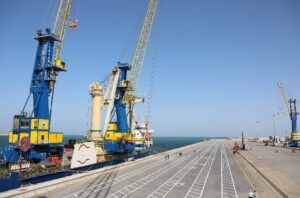
Yet, India’s aspirations go beyond mere trading hubs; these ports serve as geopolitical maneuvers. Let’s explore further into India’s maritime strategy for the development of ports abroad.
Chabahar Port in Iran: In May 2024, eight years after establishing the general framework of cooperation for Chabahar Port, India and Iran signed a 10-year operational contract. This agreement, between Indian Ports Global Ltd. (IPGL – a joint venture between Jawaharlal Nehru Port Trust and Kandla Port Trust, specifically for Indian investments abroad) and Iran’s Port and Maritime Organisation (PMO), allows IPGL—fully owned by India’s Ministry of Ports, Shipping and Waterways—to operate the Shahid-Beheshti terminal. IPGL will invest around $120 million in port equipment, and India has offered a $250 million credit line for projects to enhance Chabahar-related infrastructure. India began managing part of the Shahid Beheshti Port on December 24, 2018. As Iran’s only deep-sea port with direct ocean access, Chabahar is crucial for India to improve trade routes to Afghanistan and Central Asia, reducing reliance on land routes through Pakistan.
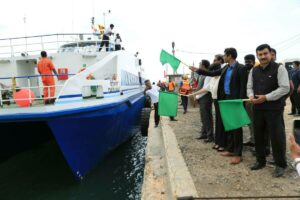
Sittwe Port in Myanmar: Myanmar holds geo-strategic importance for both India and China. India invested in the construction of the deep-water Sittwe Port in Myanmar in 2016. The port was constructed as part of the Kaladan Multi-Modal Transit Transport Project, connecting Myanmar’s Sittwe Port to the Myanmar-India border. In April 2024, India gained the right to operate the port. The Ministry of External Affairs (MEA) approved a proposal for IPGL to manage the entire port, located on the Kaladan River.
Kankesanthurai Port in Sri Lanka: In April 2024, the Sri Lankan Cabinet approved the renovation of this port in the Northern Province, with India covering the entire project cost of approximately $61.5 million under a public-private partnership model. Kankesanthurai Port (KKS Port) spans 16 acres and is located 104 km (56 nautical miles) from Karaikal Port in Pondicherry, India. A direct passenger ship service connects Nagapattinam in Tamil Nadu to Kankesanthurai Port near Jaffna, covering 111 km (60 nautical miles) in about 3.5 hours.
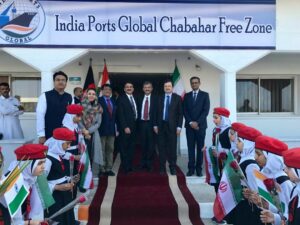
Chattogram and Mongla Ports in Bangladesh: A 2018 bilateral agreement between India and Bangladesh allowed India to use Chattogram and Mongla ports for transhipment, enhancing connectivity between the two nations. In April 2023, Bangladesh granted India permanent access to these ports.
Additionally, India has shown interest in operating Mongla Port in Bangladesh and constructing a new terminal, amid China’s efforts to manage the strategically located port. Successfully negotiating this deal would make Mongla the third international seaport operated by India, after Chabahar and Sittwe, both managed by IGPL.
Port Louis in Mauritius: In Feb 2024, Mauritian Prime Minister Pravind Jugnauth and Indian PM Narendra Modi jointly inaugurated the Indian-financed airstrip and jetty on Agaléga, a pair of islands in the western Indian Ocean, along with other community development initiatives. Despite reports speculating that India is secretly building a naval outpost on Agaléga Island, Port Louis denies any military intentions for the remote island.
In 2015, India signed an agreement with Mauritius for the development of Agaléga Islands. Located 1,122 km north of Mauritius in the southwestern Indian Ocean, Agaléga has a total land area of 27 square miles (70 square km). The $87 million project is funded by India.
Duqm Port in Oman: In Feb 2024, Oman allocated a specific zone to India in the strategically important Port of Duqm following Sultan Haitham bin Tariq’s visit to New Delhi. This move enhanced the Indian Navy’s role as a net security provider amid the ongoing crisis in the Red Sea and western Indian Ocean region. The allocation grants India a significant strategic foothold, given Duqm’s vantage point overlooking the Gulf of Oman, the Indian Ocean, and the Arabian Sea.
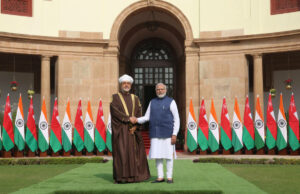
India also signed an agreement with Oman for military use and logistical support at Duqm, reinforcing India’s maritime posture in the Indian Ocean Region. The port provides a crucial logistical base for maritime cooperation, aligning with India’s maritime goals and strengthening its position in the region.
Sabang Port in Indonesia: India has shown interest in Sabang Port, Indonesia. In October 2023, India and Indonesia held multiple high-level meetings to discuss enhancing Sabang Port infrastructure. Located near the entrance to the Malacca Strait, Sabang Port is strategically important due to its proximity to major shipping routes. A potential deal with Indonesia aims to strengthen India’s presence near the Malacca Strait.
Vladivostok in Russia: There are discussions underway to revive the maritime transport corridor from the port of Chennai to Vladivostok, which operated successfully during the Soviet era. Vladivostok is Russia’s largest port on the Pacific seaboard. In 2019, the Russian Ministry of Transport and the Indian Ministry of Ports, Shipping, and Waterways signed an agreement to develop marine traffic between Vladivostok and Chennai ports during the Eastern Economic Forum, as reported by TASS.
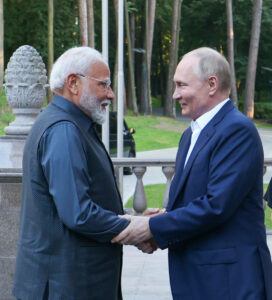
Private Investment in Maritime Diplomacy
This maritime chess match isn’t limited to governments alone. Mumbai-listed corporate titans ‘Adani Ports And Special Economic Zone Ltd’ (APSEZ), a subsidiary of the Adani Group and India’s biggest private port operator, has also invested in Sri Lanka, Israel and Oman and is planning investments in the Philippines and Indonesia.
Adani in Sri Lanka: APSEZ acquired a majority stake of 51% in the Colombo West International Container Terminal (CWICT). This investment, totaling over $700 million, marks the largest foreign investment in Sri Lanka’s port sector in Sep 2021. The partnership aims to develop CWICT jointly with Sri Lanka’s John Keells Holdings and the state-owned Sri Lanka Ports Authority (SLPA). Serving as a crucial link between Europe, the Middle East, Africa, and Asia, the port has garnered significant interest from China in recent years, aligning with Beijing’s One Belt One Road Initiative. China currently holds an 85% stake in Colombo International Container Terminals, which is the sole deepwater terminal at the port.
Adani in Israel: In July 2022, APSEZ partnered with the Gadot Group in Israel and secured the lease to privatize Israel’s Port of Haifa for $1.18 billion. The Port of Haifa handles nearly half of Israel’s container freight and serves as the primary port for cruise ships and passenger traffic in the country. This move strengthens India’s presence in Israel and aims to establish strategic trade routes between Indian ports and Haifa, enhancing bilateral trade.
Adani in Oman: The Adani Group has signed an MoU to develop Duqm Port under Oman’s ‘Investment in Oman’ program. Concrete plans are pending, but Oman officials express optimism about Indian investments in the country, particularly in Duqm port development.
Adani in the Philippines and Indonesia: APSEZ plans to invest in a port in the Philippines, eyeing the Bataan province for its development. Discussions are ongoing, and APSEZ Managing Director Karan Adani recently met Philippines President Ferdinand R. Marcos Jr. to discuss these plans.
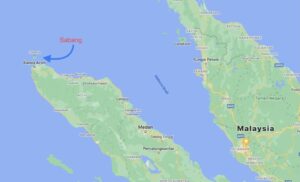
APSEZ is in talks with the Indonesian government to develop the strategically vital Sabang Port, aiming to enhance maritime connectivity in the region.
According to Ministry of Shipping data, 95% of India’s foreign trade is conducted through ports. Thus, the Indian Government is prioritizing the development of Indian ports through initiatives like Maritime India Vision 2030 (MIV) and the Sagarmala Project. India’s port diplomacy is multifaceted: the government facilitates state-backed deals via entities like IPGL, while also enabling major commercial investments by corporate giants like the Adani Group across locations from Sri Lanka to Haif.
The intense maritime rivalry between India and China is escalating throughout the Indo-Pacific region. While China aggressively expands its strategic port assets through the Belt and Road Initiative, India is mounting a robust counter-strategy.
India is strategically establishing its presence at crucial ports and shipping lanes to safeguard its maritime trade routes, assert naval power, and counter China’s growing maritime influence.
As an increasingly assertive maritime force, India emerges as a formidable challenger to China’s perceived maritime supremacy. The high-stakes competition for port dominance is just beginning, with India poised to challenge China’s dominance.









